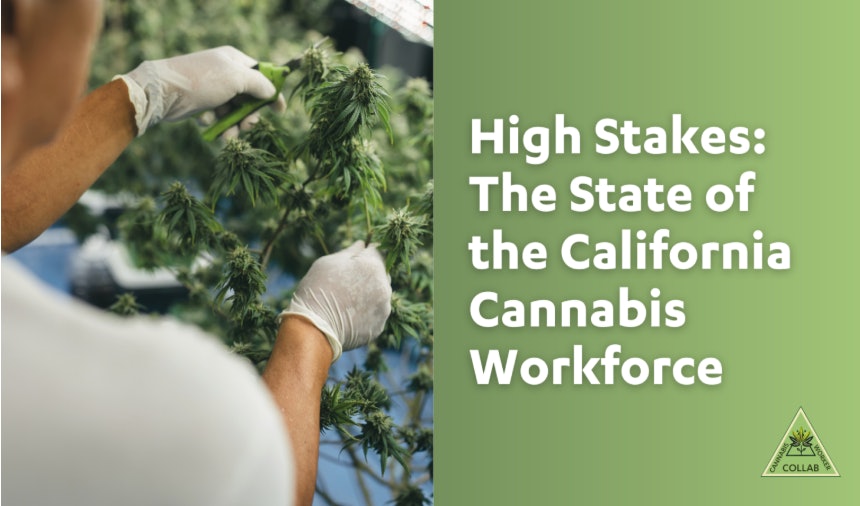[PRESS RELEASE] – LOS ANGELES, May 28, 2025 — Researchers from the UCLA Labor Center and the grassroots research hub Cannabis Worker Collab released the first-ever comprehensive report on California’s cannabis workforce. Titled High Stakes: The State of the California Cannabis Workforce, the report is based on more than 1,111 surveys, 50-plus interviews, and seven interactive data sessions. It offers an unprecedented look at one of California’s most dynamic and diverse emerging industries and reveals alarming workplace conditions, pervasive wage theft, and the urgent need for stronger labor protections.
With widely varying implementation of safety practices in the industry, cannabis workers are facing hazardous conditions. Some of the report’s findings include:
85% of respondents expressed a need for stronger health and safety protections in the industry.Nearly half of cultivation workers experience back and neck pain, with nearly a third reporting skin blisters or infections and eye pain or strain from the production process.More than 60% of all delivery workers reported being pressured to conduct deliveries faster than what was safe.
Cannabis workplaces remain shaped by the legacy of the drug war, including the requirement to carry cash and patterns of gender and racial inequality. Among the report’s findings:
Nearly one-third of workers experienced robberies or burglaries, and 15% of licensed workers were subject to violent police raids, which is only slightly higher in unlicensed sectors.27% of women reported sexual harassment, often from bosses, managers or customers.More than one-third of all workers experienced racial slurs or intimidation, and 28% experienced homophobic or transphobic comments, which came from upper management, other workers or customers.
“I’ve had co-workers who’ve had guns pulled on them or been robbed,”said Lay Lay Lee, a cannabis delivery driver in the Bay Area. “Because of how the system is set up under legalization, we often carry thousands of dollars in cannabis products and cash, and we’re constantly rushing to and from depots to meet order demands.”
Average cannabis wages exceed general retail and delivery wages, but still aren’t enough to make ends meet in California. The report found:
The cannabis workforce is highly skilled, with workers earning a median hourly wage of $19.50, above California’s minimum wage and median wages in retail and delivery.Nearly 43% of women, 29% of men and 81% of gender nonconforming workers said they had trouble paying for food or groceries within the last year.More than 62% of workers experience some form of wage theft, such as late pay (29%) or being asked to do unpaid work (13%).
The cannabis workforce is young, diverse, and eager for professional growth and training. Among several findings:
The workforce reflects broad demographic diversity: 38% identified as Latina/o, 22% as Black, and 11% as AAPI; 49% were women; 23% identified as LGBTQ+; and 89% were under 40, with 21% aged 18–24 and 68% aged 25–39.93% of workers expressed a desire for more opportunities to grow in their cannabis careers.70–80% of workers are seeking in-depth training on cultivation techniques and medical cannabis care, key aspects that can improve both environmental impact and public health.
“This industry attracts workers with a deep passion for people and the plant and a vision for meaningful careers in patient and customer care and cultivation,” said Robert Chlala, co-author and research lead at the UCLA Labor Center. “But right now, workers aren’t getting the safety, stability or opportunity that will allow them to build long-term careers that contribute to their communities.”
Unionization has provided a pathway to stability, equity and health benefits in the cannabis industry. Some of the key findings include:
Unionization rates among cannabis workers are significant, with approximately 20% of surveyed workers reporting union membership, at rates much higher than overall unionization in California and in retail or agriculture overall.69% of union workers reported receiving raises, compared to 50% of nonunion workers.65% of union workers had employer-provided health insurance, compared to 41% of nonunion workers.
“As a budtender at a licensed and unionized shop in Southern California, I saw a real difference in job stability,” said Stephanie Balcazar, a shop steward and safety trainer. “Having a consistent paycheck every two weeks, and even just receiving a pay stub, made a big difference.”
“We’ve seen firsthand how organizing leads to better pay, safety protections and dignity at work,” said Mskindness Batchelor-Ramirez, report co-author and founder of Club Kindness, an organization dedicated to cannabis education. “These workers are demanding a voice in shaping the future of the cannabis industry, and they deserve it.”
The report concludes with several key recommendations from the researchers to improve job quality and support long-term equity in the cannabis industry. Among them:
Support higher wages through tax reduction and other incentives for employers to increase retention and the impact of the industry locally.Mandate certified training for cannabis workers and invest in public workforce development courses and paid apprenticeships.Shift from criminal to civil enforcement in cannabis and create pathways out of the unregulated market to safer, better-paying jobs.Strengthen partnerships among unions and social equity groups to create worker-led cooperatives.
To access the full report, visit: bit.ly/uclacannabisreport
The UCLA Labor Center and Cannabis Worker Collab released the report based on 1,100-plus worker voices, documenting how unions can deliver change. Read More


